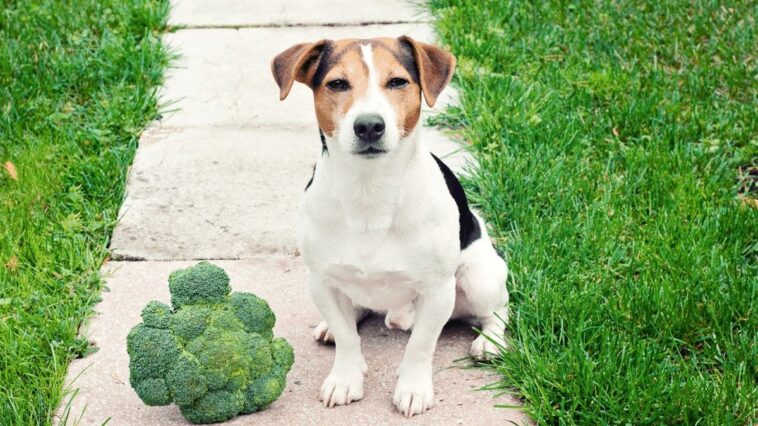Broccoli is a nutritious vegetable packed with vitamins and minerals, making it a popular choice for health-conscious humans. But what about dogs? Can they eat broccoli too? As a responsible pet owner, ensuring your dog’s diet is balanced and provides all the necessary nutrients for their health and well-being is essential.
In this post, we’ll explore whether dogs can eat broccoli and the potential benefits and risks of feeding it to your furry friend. We’ll also provide tips on how to safely feed broccoli to your dog, including the different forms of broccoli and their impact on dogs, signs of broccoli allergy in dogs, and safe feeding practices to follow.
The Nutritional Benefits of Broccoli for Dogs
Broccoli is a vegetable that offers a wealth of nutrition, including vitamins, minerals, and fiber. It can be a healthy addition to your dog’s diet if given in moderation. The benefits of broccoli for dogs include:
- Vitamins: Broccoli is rich in vitamins A, C, and K, all of which are important for maintaining good health in dogs. Vitamin A helps support healthy vision, while vitamin C is an antioxidant that can help boost the immune system. Vitamin K is important for blood clotting and bone health.
- Minerals: Broccoli contains several vital minerals that are essential for dogs, including calcium, potassium, and phosphorus. Calcium is important for bone health, while potassium helps regulate fluid balance in the body. Phosphorus is important for energy metabolism and maintaining healthy bones and teeth.
- Fiber: Including broccoli in your dog’s diet is beneficial as it is an excellent source of fiber. This helps in regulating digestion and encourages regular bowel movements. Additionally, fiber intake makes your dog feel full and assists in maintaining a healthy weight.
- Antioxidants: Broccoli contains several antioxidants, including beta-carotene, lutein, and zeaxanthin. These compounds can help protect cells from damage caused by free radicals, which can contribute to aging and disease.
Please remember that although broccoli is a healthy dog food, it is best to give it to them in small amounts. Overfeeding broccoli to your dog can lead to digestive problems like diarrhea or excessive gas.
It’s important to avoid feeding raw broccoli to dogs, as it can be tough for them to digest and could have harmful bacteria. It’s advisable to seek advice from your veterinarian before significantly adjusting your dog’s diet.
Can Dogs Eat Broccoli?
Dogs can eat broccoli. Broccoli is a safe and nutritious vegetable for dogs to consume when fed in moderation and appropriately prepared.
Broccoli is a great way to provide your dog with essential vitamins and minerals like fiber, vitamin C, and vitamin K, which can help maintain their overall health and well-being. Nevertheless, it’s important to remember that feeding broccoli to dogs might pose some risks, such as digestive problems and choking.
Although rare, some dogs may have an allergic reaction to broccoli. Therefore, while broccoli can provide numerous health benefits to your furry friend, it is crucial to exercise caution when feeding it to them and to consult with your veterinarian if you have any apprehensions about incorporating it into their diet.
By following safe feeding practices and seeking professional guidance, you can ensure your dog can safely reap the rewards of this nutritious vegetable.
Potential Risks of Feeding Broccoli to Dogs
Although broccoli can offer nutritional benefits to dogs, it’s essential to be aware of the potential risks associated with feeding it. Here are a few risks to keep in mind when considering broccoli as a food option for your dog:
- Digestive Issues: Broccoli is high in fiber, which can benefit dogs in moderation. However, too much fiber can cause digestive issues, such as gas, bloating, or diarrhea. It’s crucial to introduce broccoli slowly into your dog’s diet and to feed it in small amounts.
- Choking Hazard: Broccoli can be a choking hazard for dogs, especially small ones or those who eat quickly. To ensure your dog’s safety, it’s important to cut the broccoli into small pieces or puree it before feeding it to them.
- Thyroid Issues: Broccoli contains compounds called glucosinolates, which can interfere with thyroid function in dogs. While this is typically only a concern for dogs who eat large amounts of broccoli regularly, it’s still crucial to be aware of the potential risk.
- Allergic Reactions: Dogs can have an allergic reaction to broccoli, which can cause symptoms such as itchiness, swelling, or difficulty breathing. If your dog is allergic to broccoli, it’s vital to consult your veterinarian for advice.
- Pesticide Residue: Broccoli is often treated with pesticides, which can harm dogs if ingested. When feeding broccoli to your dog, it’s essential to choose organic options whenever possible or thoroughly wash it before feeding it to your dog.
Adding broccoli to your dog’s diet can benefit their health, but it’s crucial to give it in moderation and consider possible risks. If you have any doubts about feeding your dog broccoli, seek advice from a veterinarian.
Different Forms of Broccoli and Their Impact on Dogs
Broccoli comes in different forms, and each can impact dogs differently. Here are some details about the different forms of broccoli and their impact on dogs:
- Fresh Broccoli: Fresh broccoli can be a healthy addition to your dog’s diet when fed in moderation. As mentioned, broccoli is high in vitamins and minerals such as C, K, folate, and potassium. It also contains fiber and antioxidants, which can help support your dog’s overall health.
- Frozen Broccoli: Frozen broccoli is a convenient option that can be easily stored and used as needed. However, ensuring that the frozen broccoli is plain and contains no additional seasonings or sauces that may harm dogs is vital.
- Broccoli Sprouts: Broccoli sprouts are young plants harvested when they are only a few days old. They are rich in antioxidants and can provide many health benefits for dogs. However, they should be fed in moderation as they can be difficult for dogs to digest.
- Broccoli Stems: Broccoli stems are often discarded, but they can be a nutritious addition to your dog’s diet. They are high in fiber and contain many of the same vitamins and minerals as the florets. However, they should be chopped into small pieces or pureed before being fed to your dog, as they can be difficult to digest.
- Broccoli Powder: Broccoli powder is a concentrated form of broccoli that can be added to your dog’s food as a supplement. Using a high-quality broccoli powder free from harmful additives and fillers is essential. However, it’s always a good idea to consult your veterinarian before adding supplements to your dog’s diet.
Broccoli can affect dogs differently depending on the form it’s in. It’s important to give it in moderation and prepare it properly before serving it to your furry friend.
Signs of Broccoli Allergy in Dogs
While allergies to broccoli are rare in dogs, they can still occur. Here are some signs of broccoli allergy in dogs:
- Itching and scratching: One of the dogs’ most common signs of food allergies is excessive itching and scratching. If your dog has an allergy to broccoli, it may start to scratch or lick itself more than usual.
- Digestive issues: Broccoli can be difficult for dogs to digest, which can be exacerbated if your dog is allergic to it. Signs of digestive issues can include diarrhea, vomiting, and excessive gas.
- Skin irritation: In some cases, dogs with broccoli allergies may develop skin irritation or rashes. This can be due to the histamines released in response to the allergen.
- Respiratory issues: In severe cases, dogs with broccoli allergies may experience respiratory issues such as coughing, wheezing, or difficulty breathing. This can be a life-threatening emergency and requires immediate veterinary attention.
If you suspect your dog has a broccoli allergy, consult your vet. They can diagnose the issue and suggest ways to manage it, such as changing their diet or prescribing medication.
Safe Ways to Feed Broccoli to Your Dog
Broccoli can be a healthy addition to your dog’s diet when fed in moderation and prepared correctly. Here are some safe ways to feed broccoli to your dog:
- Cooked broccoli: Cooked broccoli is the safest way to feed broccoli to your dog. This is because cooking breaks down the tough cell walls in the broccoli, making it easier for your dog to digest. You can steam, boil, or roast the broccoli before feeding it to your dog. It’s essential to avoid adding any seasonings or sauces that may harm dogs.
- Chopped or pureed broccoli: Broccoli can be difficult for dogs to digest, especially if it’s raw or in large pieces. To make it easier for your dog to eat, chop or puree the broccoli before feeding it to your dog. This can also help prevent choking hazards.
- Broccoli stems: Broccoli can be a healthy addition to your dog’s diet. Don’t let those stems go to waste! Just chop them into small pieces or puree them first, as they can be tough for dogs to digest.
- Broccoli supplements: You can add broccoli supplements, like broccoli powder, to your dog’s food as an additional source of nutrients. However, using a high-quality broccoli supplement free from harmful additives and fillers is important. Always consult your veterinarian before adding any supplements to your dog’s diet.
- Moderation: Including broccoli in your dog’s diet can be beneficial, but it should be in moderation. Overfeeding broccoli can result in digestive problems and even blockage in the intestines. Limiting broccoli intake to a maximum of 10% of your dog’s diet is recommended.
Including broccoli in your dog’s diet can be a healthy choice, but it’s crucial to serve it in moderation and properly prepare it. If you have any doubts about feeding broccoli to your furry friend, it’s best to seek advice from your veterinarian.
Conclusion
Broccoli can be a healthy addition to your dog’s diet when fed in moderation and prepared correctly. It contains essential vitamins and nutrients, including fiber, C, and K. However, it’s essential to be aware of the potential risks of feeding broccoli to your dog, such as digestive issues and choking hazards.
Additionally, while allergies to broccoli are rare in dogs, it’s essential to be aware of the signs of broccoli allergy and to consult with your veterinarian if you suspect your dog may be allergic to broccoli.
By following safe feeding practices and consulting with your veterinarian, you can ensure that your dog can safely enjoy the benefits of broccoli as part of a healthy and balanced diet.





